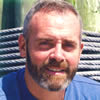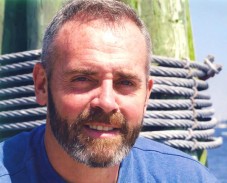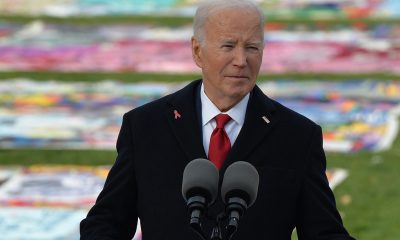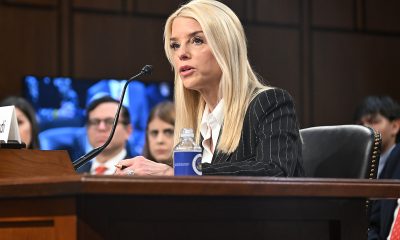National
Richard Hatch maintains his innocence
Gay ‘Survivor’ winner sees judicial system as ‘corrupt’


‘Survivor’ Richard Hatch is out of prison again and still maintains his innocence against tax evasion charges. (Photo courtesy Richard Hatch)
Richard Hatch became the first winner of the hit CBS show “Survivor” in 2000, but in the 11 years since, he’s had to survive more than backstabbing teammates, physical challenges and meals consisting of insects.
In 2006, Hatch, who is gay, was sentenced by a judge in Rhode Island to 51 months in federal prison on tax evasion charges, and was freed on probation in 2009. Prosecutors argued that Hatch failed to report his $1 million in winnings from “Survivor,” and money from subsequent public appearances. Hatch denied all charges. Earlier this year he was back in prison on charges of violating his parole after prosecutors claimed the 50-year-old reality TV star failed to re-file his 2000 federal income tax returns, a charge that Hatch denies.
“The prosecutor in this case is nothing short of a bully, and what I’ve been subjected to is nothing short of institutionalized bullying by the prosecutors, the probation department and the judge involved,” Hatch told the Blade just days after his Dec. 12 release from prison. “That’s provable, that’s observable by any objective viewers.”
“I’m absolutely innocent and have been since day one,” Hatch insisted.
Since winning “Survivor,” Hatch has been in and out of legal trouble, including a short arrest in 2009 as a result of granting several interviews with media outlets that were seen as a violation of the terms of his probation. Since his legal woes began in 2005, Hatch has maintained he never intentionally broke the law.
“It’s 2011 and they haven’t yet determined if something is owed for 2000,” Hatch told the Blade. “And all the prosecutor has done is prevented us from getting to the truth by lying to the court and claiming that my arguments aren’t valid when the IRS agents have verified everything I’ve claimed all along from day one.”
He continued, “They convicted me of attempting to evade taxes in 2006 that to this day have never been determined to be due,” Hatch said. “I filed that return in 2002 at the instruction and direction of the IRS using the numbers that they told me to use, I’ve been working with them through a tax attorney and a CPA ever since, and they have yet to complete the assessment for that year, 11 years later now.”
Hatch says he’s fully complied with the terms of his probation.
“When I was on probation, ‘Survivor’ created a show for me this ‘Redemption Island’ they invited me back to face Russell [Hantz],” Hatch told the Blade. “I’d completed my entire sentence, was on probation, perfectly compliant with anything and everything they ever asked, and probation fought the return of my passport, and prevented me, basically, from going on ‘Survivor.’”
“That’s twice now that I’ve been invited and they’ve refused to give me my passport while hypocritically lying, claiming I owe taxes — which I don’t — and arguing with the court that I’m refusing to pay them,” he continued. “So they’re blocking my ability to earn an income, and at the same time telling the court that I won’t pay. And none of it’s true.”
Hatch said that his jail time is the result of bias.
“I’ve learned how absurd these courts are. The original judge, who was biased against me, and held off his retirement to hear the case because he’d been admonished in an earlier case of mine for overstepping his bounds, he should have recused himself and didn’t — [Earnest C.] Torres — and this current judge, his mentee, his protege, William Smith, know so little about taxes they just don’t care. They listen to the prosecutor’s lies, and do whatever they tell them to do.”
“That in itself is reprehensible,” he added.
Hatch declined to answer questions about whether he’s found a job and a place to live after several media reports claimed that Hatch was homeless after his stint in prison.
“It’s just nobody’s business where I’m living and what I’m doing. I have much on my plate, I have some really fascinating opportunities that I’m working on. I’m not interested in talking about it.”
When asked whether he is homeless, Hatch replied, “Again, report whatever you’d like, I’ll give you the same answer, I don’t know where I’m staying.”
Hatch views the American justice system as deeply flawed.
“It’s not just because of my notoriety. It’s mostly because of my unconventionality, part of which is because I’m gay.”
Hatch said that unconventional people like himself — gay people, women, and African Americans — are unfairly targeted and “bullied” by a broken justice system.
“When you have people who want to take advantage of you, abuse you, persecute you, continue to feed the media caricature of this negative image, just because I’m an unconventional guy, that’s what they’ll do.”
Hatch said that the homophobia he claims he faced during his ordeal was not in prison, but in the court system.
“In prison I didn’t face anything significant that’s worth talking about as far as negativity from my peers,” he said. “I faced the same variety of subtle indignities that are brought by people in positions of power who don’t respect those positions and are insecure and otherwise mentally ill. And do things to abuse people who aren’t able to defend themselves.”
National
Supreme Court deals blow to trans student privacy protections
Under this ruling, parents are entitled to be informed about their children’s gender identity at school, regardless of state protections for student privacy.

The Supreme Court on Monday blocked a California policy that allowed teachers to withhold information about a student’s gender identity from their parents.
The policy had permitted California students to explore their gender identity at school without that information automatically being disclosed to their parents. Now, educators in the state will be required to inform parents about developments related to a student’s gender identity, depending on how the case proceeds in lower courts.
The case involves two sets of parents — identified in court filings as John and Jane Poe and John and Jane Doe — both of which say their daughters began identifying as boys at school without their knowledge, citing religious objections to gender transitioning.
The Poes say they only learned about their daughter’s gender dysphoria after she attempted suicide in eighth grade and was hospitalized. After treatment for the attempt and after being returned to school the following year, teachers continued using a male name and pronouns despite the parents’ objections, citing California law. The Poes have since placed their daughter in therapy and psychiatric care.
Similarly, the Does say their daughter has intermittently identified as a boy since fifth grade, but while their daughter was in seventh grade, they confronted school administrators over concerns that staff were using a male name and pronouns without informing them. The principal told them state law barred disclosure without the child’s consent.
Both sets of parents filed lawsuits in the U.S. District Court for the Southern District of California challenging the state policy that protects students’ gender identity and limits when schools can disclose that information to parents.
The justices voted along ideological lines, with the court’s six conservative members in the majority and the three liberal justices dissenting.
“We conclude that the parents who seek religious exemptions are likely to succeed on the merits of their Free Exercise Clause claim,” the court said in an unsigned order. “The parents who assert a free exercise claim have sincere religious beliefs about sex and gender, and they feel a religious obligation to raise their children in accordance with those beliefs. California’s policies violate those beliefs.”
In dissent, the three liberal justices argued that the case is still working its way through the lower courts and that there was no need for the high court to intervene at this stage. Justice Elena Kagan wrote, “If nothing else, this Court owes it to a sovereign State to avoid throwing over its policies in a slapdash way, if the Court can provide normal procedures. And throwing over a State’s policy is what the Court does today.”
Conservative Justices Samuel Alito and Clarence Thomas indicated they would have gone further and granted broader relief to the parents and teachers challenging the policy.
The emergency appeal from a group of teachers and parents in California followed a decision from the United States Court of Appeals for the Ninth Circuit that allowed the state’s policy to remain in effect. The appeals court had paused an order from U.S. District Judge Roger Benitez — who was nominated by George W. Bush — that sided with the parents and teachers and put the policy on hold.
The legal challenge was backed by the Thomas More Society, which relied heavily on a decision last year in which the court’s conservative majority sided with a group of religious parents seeking to opt their elementary school children out of engaging with LGBTQ-themed books in the classroom.
California Attorney General Rob Bonta expressed disappointment with the ruling. “We remain committed to ensuring a safe, welcoming school environment for all students while respecting the crucial role parents play in students’ lives,” his office said in a statement.
The decision comes as the Trump administration has taken a hardline approach to transgender rights. During his State of the Union address last week, President Donald Trump referenced Sage Blair, who previously identified as transgender and later detransitioned, describing Blair’s experience transitioning in a public school. According to the president, school employees supported Blair’s chosen gender identity and did not initially inform Blair’s parents.

Last year, the court upheld Tennessee’s ban on gender-affirming medical care for transgender minors and has allowed enforcement of a policy barring transgender people from serving in the military to continue during Trump’s second term.

The Comings & Goings column is about sharing the professional successes of our community. We want to recognize those landing new jobs, new clients for their business, joining boards of organizations and other achievements. Please share your successes with us at [email protected].
Congratulations to Gil Pontes III on his recent appointment to the Financial Advisory Board for the City of Wilton Manors, Fla. Upon being appointed he said, “I’m honored to join the Financial Advisory Board for the City of Wilton Manors at such an important moment for our community. In my role as Executive Director of the NextGen Chamber of Commerce, I spend much of my time focused on economic growth, fiscal sustainability, and the long-term competitiveness of emerging business leaders. I look forward to bringing that perspective to Wilton Manors — helping ensure responsible stewardship of public resources while supporting a vibrant, inclusive local economy.”
Pontes is a nonprofit executive with years of development, operations, budget, management, and strategic planning experience in 501(c)(3), 501(c)(4), and political organizations. Pontes is currently executive director of NextGen, Chamber of Commerce. NextGen Chamber’s mission is to “empower emerging business leaders by generating insights, encouraging engagement, and nurturing leadership development to shape the future economy.” Prior to that he served as managing director of The Nora Project, and director of development also at The Nora Project. He has held a number of other positions including Major Gifts Officer, Thundermist Health Center, and has worked in both real estate and banking including as Business Solutions Adviser, Ironwood Financial. For three years he was a Selectman, Town of Berkley, Mass. In that role, he managed HR and general governance for town government. There were 200+ staff and 6,500 constituents. He balanced a $20,000,000 budget annually, established an Economic Development Committee, and hired the first town administrator.
Pontes earned his bachelor’s degree in political science from the University of Massachusetts, Dartmouth.
Kansas
ACLU sues Kansas over law invalidating trans residents’ IDs
A new Kansas bill requires transgender residents to have their driver’s licenses reflect their sex assigned at birth, invalidating current licenses.

Transgender people across Kansas received letters in the mail on Wednesday demanding the immediate surrender of their driver’s licenses following passage of one of the harshest transgender bathroom bans in the nation. Now the American Civil Liberties Union is filing a lawsuit to block the ban and protect transgender residents from what advocates describe as “sweeping” and “punitive” consequences.
Independent journalist Erin Reed broke the story Wednesday after lawmakers approved House Substitute for Senate Bill 244. In her reporting, Reed included a photo of the letter sent to transgender Kansans, requiring them to obtain a driver’s license that reflects their sex assigned at birth rather than the gender with which they identify.
According to the reporting, transgender Kansans must surrender their driver’s licenses and that their current credentials — regardless of expiration date — will be considered invalid upon the law’s publication. The move effectively nullifies previously issued identification documents, creating immediate uncertainty for those impacted.
House Substitute for Senate Bill 244 also stipulates that any transgender person caught driving without a valid license could face a class B misdemeanor, punishable by up to six months in jail and a $1,000 fine. That potential penalty adds a criminal dimension to what began as an administrative action. It also compounds the legal risks for transgender Kansans, as the state already requires county jails to house inmates according to sex assigned at birth — a policy that advocates say can place transgender detainees at heightened risk.
Beyond identification issues, SB 244 not only bans transgender people from using restrooms that match their gender identity in government buildings — including libraries, courthouses, state parks, hospitals, and interstate rest stops — with the possibility for criminal penalties, but also allows for what critics have described as a “bathroom bounty hunter” provision. The measure permits anyone who encounters a transgender person in a restroom — including potentially in private businesses — to sue them for large sums of money, dramatically expanding the scope of enforcement beyond government authorities.
The lawsuit challenging SB 244 was filed today in the District Court of Douglas County on behalf of anonymous plaintiffs Daniel Doe and Matthew Moe by the American Civil Liberties Union, the ACLU of Kansas, and Ballard Spahr LLP. The complaint argues that SB 244 violates the Kansas Constitution’s protections for personal autonomy, privacy, equality under the law, due process, and freedom of speech.
Additionally, the American Civil Liberties Union filed a temporary restraining order on behalf of the anonymous plaintiffs, arguing that the order — followed by a temporary injunction — is necessary to prevent the “irreparable harm” that would result from SB 244.
State Rep. Abi Boatman, a Wichita Democrat and the only transgender member of the Kansas Legislature, told the Kansas City Star on Wednesday that “persecution is the point.”
“This legislation is a direct attack on the dignity and humanity of transgender Kansans,” said Monica Bennett, legal director of the ACLU of Kansas. “It undermines our state’s strong constitutional protections against government overreach and persecution.”
“SB 244 is a cruel and craven threat to public safety all in the name of fostering fear, division, and paranoia,” said Harper Seldin, senior staff attorney for the ACLU’s LGBTQ & HIV Rights Project. “The invalidation of state-issued IDs threatens to out transgender people against their will every time they apply for a job, rent an apartment, or interact with police. Taken as a whole, SB 244 is a transparent attempt to deny transgender people autonomy over their own identities and push them out of public life altogether.”
“SB 244 presents a state-sanctioned attack on transgender people aimed at silencing, dehumanizing, and alienating Kansans whose gender identity does not conform to the state legislature’s preferences,” said Heather St. Clair, a Ballard Spahr litigator working on the case. “Ballard Spahr is committed to standing with the ACLU and the plaintiffs in fighting on behalf of transgender Kansans for a remedy against the injustices presented by SB 244, and is dedicated to protecting the constitutional rights jeopardized by this new law.”
-

 India5 days ago
India5 days agoActivists push for better counting of transgender Indians in 2026 Census
-

 Advice5 days ago
Advice5 days agoDry January has isolated me from my friends
-

 National5 days ago
National5 days agoAfter layoffs at Advocate, parent company acquires ‘Them’ from Conde Nast
-

 District of Columbia5 days ago
District of Columbia5 days agoCapital Pride reveals 2026 theme




















